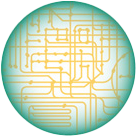Developing Genome Engineering Technologies in Cupriavidus necator for Carbon-Negative Biomanufacturing
Authors:
Akira Nakamura* ([email protected]), Jaymin Patel, Joonseok Oh, Shenqi Wang, Laura Quinto, Jason Crawford, and Farren J. Isaacs
Institutions:
Yale University
Abstract
The accelerating climate crisis combined with rapid population growth poses some of the most urgent challenges to humankind. A major contributing factor to this crisis is the unabated release and accumulation of CO2 across the biosphere. Researchers can take advantage of this abundance of available CO2 to transform the way the world produces and uses carbon by engineering CO2-fixing biosystems to produce commodity fuels and chemicals. Engineering efforts in CO2-fixing organisms are currently limited by an incomplete understanding of genotype-phenotype relationships and inefficient genome engineering tools to discern these relationships. To address such issues, researchers have developed an integrated computational and experimental workflow–computer-aided design of synthetic genetic elements (CAD-SGE)-to redesign multigene biological pathways for mobilization, expression, and characterization in versatile organisms (Patel et al. 2022). Heterologous expression and characterization of large pathways (i.e., tyrocitabine pathway, violacein pathway) has been demonstrated using this CAD-SGE technology in diverse prokaryotes and eukaryotes, including Escherichia coli, Pseudomonas putida, Klebsiella aerogenes, Salmonella enterica, and Saccharomyces cerevisiae. Here, researchers demonstrate the expansion of the landing pad-based mobilization strategy into Cupriavidus necator, an aerobic autotroph that utilizes the Calvin cycle. Genomic integration of the landing pad will allow streamlined integration and expression of large heterologous genetic elements in C. necator. By implementing the CAD-SGE technology in C. necator and other CO2-fixing organisms, researchers hope to improve the understanding of CO2-utilizing microbes and contribute to the development of sustainable and carbon-neutral technologies.
References
Patel, J., et al. 2022. “In brief Cross-Kingdom Expression of Synthetic Genetic Elements Promotes Discovery of Metabolites in the Human Microbiome.” Cell, 185. DOI: https://doi.org/10.1016/j.cell.2022.03.008.
Funding Information
This research was supported by the DOE Office of Science, Office of Biological and Environmental Research (BER), grant no. DE-FOA-0002600.
